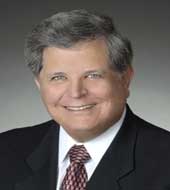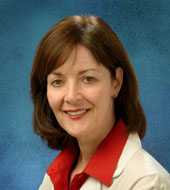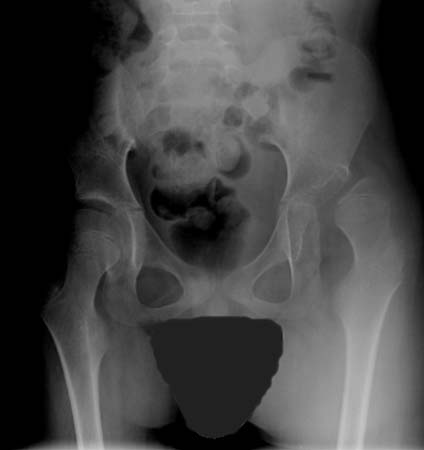Summary
Definition
History and exam
Key diagnostic factors
- presença de fatores de risco
- anormalidades precoces no movimento em geral
- escores de HINE anormais
- atraso no desenvolvimento motor
- atraso no desenvolvimento da fala
- atraso no desenvolvimento cognitivo/intelectual
- retenção dos reflexos primitivos
- ausência de reflexos apropriados para a idade
- espasticidade/clônus
- deficiência seletiva do controle motor voluntário
- marcha digitígrada/hiperextensão do joelho
- marcha em tesoura
- marcha em agachamento
- contraturas
Other diagnostic factors
- fraqueza muscular
- instabilidade/luxação articular
- distonia
- coreia
- atetose
- ataxia
- hipotonia neonatal
- escoliose
Risk factors
- prematuridade
- baixo peso ao nascer
- asfixia fetal ao nascimento
- nascimentos múltiplos
- doença materna
- malformação cerebral fetal
- grandes malformações congênitas
- distúrbio metabólico/genético familiar
- complicações neonatais
- meningite
- exposição teratogênica materna
- condição socioeconômica baixa
- apresentação anômala (outra que não de vértice)
- pós-datismo
- traumatismo cranioencefálico
Diagnostic tests
1st tests to order
- ressonância nuclear magnética (RNM) cranioencefálica
Tests to consider
- ultrassonografia/tomografia computadorizada (TC) cranioencefálica
- exames de coagulação
- teste genético
- triagem metabólica
- raio-x da articulação afetada
- análise instrumental da marcha
Treatment algorithm
hemiplegia espástica
diplegia espástica
quadriplegia espástica
discinético
atáxico
Contributors
Authors
UCLA/Orthopaedic Institute for Children Center for Cerebral Palsy, null
Los Angeles
CA
Disclosures
See individual author disclosures.
William L. Oppenheim, MD

Distinguished Professor Emeritus Pediatric Orthopedics
Margaret Jones Kanaar Chair, Cerebral Palsy
David Geffen School of Medicine at UCLA
Los Angeles
CA
Disclosures
WLO is an author of several references cited in this topic.
Loretta Staudt, MS, PT

Research Physical Therapist
UCLA/Orthopaedic Institute for Children Center for Cerebral Palsy
David Geffen School of Medicine at UCLA
Los Angeles
CA
Disclosures
LS is a clinical evaluator for several sponsored clinical trials as part of her salaried employment at UCLA. She has received travel, meals, and accomodation to attend training meetings for some of these trials but does not receive any direct reimbursements or personal benefits from the companies, which include Pfizer, Sarepta, Audentes Therapeutics, Bristol-Meyers Squibb, Biogen, Santhera, Fibrogen, Cytokinetics, Italfarmaco, and AveXis. As part of her salaried employment at UCLA, LS is working on a project funded by the Cerebral Palsy Foundation. She is an author of several references cited in this topic.
Rachel Thompson, MD
Assistant Professor-in-Residence, Department of Orthopaedic Surgery
Associate Residency Program Director, Department of Orthopaedic Surgery
Director, UCLA/Orthopaedic Institute for Children Center for Cerebral Palsy
William and Patricia Oppenheim Presidential Chair in Pediatric Orthopaedics
David Geffen School of Medicine at UCLA
Los Angeles
CA
Disclosures
RT declares that she has no competing interests.
Marcia Greenberg, MS, PT

Physical Therapist
UCLA/Orthopaedic Institute for Children Center for Cerebral Palsy
David Geffen School of Medicine at UCLA
Los Angeles
CA
Disclosures
MG is a consultant for the NGO, UCP Wheels for Humanity, teaching physical therapists in developing countries. She is an author of several references cited in this topic.
Eileen Fowler, PhD, PT

Professor
Department of Orthopaedic Surgery
Director of Research and Education
UCLA/Orthopaedic Institute for Children Center for Cerebral Palsy
Peter William Shapiro Chair
David Geffen School of Medicine at UCLA
Los Angeles
CA
Disclosures
EF receives grant funding from the Cerebral Palsy Foundation. She is a member of the Scientific Advisory Committee of the Cerebral Palsy Foundation. She is an author of several references cited in this topic.
Acknowledgements
Dr William L. Oppenheim, Loretta Staudt, Dr Rachel Thompson, Marcia Greenberg, and Dr Eileen Fowler wish to gratefully acknowledge Dr Albert Stroberg, Dr Erika Hassan, Dr Rebecca Hanson, Dr Joan Earle Hahn, Dr Tien T. Nguyen, and Dr Sarah Copeland, previous contributors to this topic.
Disclosures
AS, EH, RH, JEH, TTN, and SC declare that they have no competing interests.
Peer reviewers
Hank Chambers, MD
Clinical Professor
Department of Orthopaedic Surgery
University of California at San Diego
Medical Affairs Officer
Rady Children's Hospital
San Diego
CA
Disclosures
HC is an author of a number of references cited in this topic. He has received research support from the National Institutes of Health greater than 6 figures USD.
Michael Sussman, MD
Orthopaedic Surgeon
Shriners Hospital for Children
Portland
OR
Disclosures
MS declares that he has no competing interests.
Charles Fairhurst, MBBS MSc
Consultant in Paediatric Neurodisability
Evelina Children's Hospital
Guy's & St Thomas' NHS Foundation Trust
London
UK
Disclosures
CF declares that he has no competing interests.
Peer reviewer acknowledgements
BMJ Best Practice topics are updated on a rolling basis in line with developments in evidence and guidance. The peer reviewers listed here have reviewed the content at least once during the history of the topic.
Disclosures
Peer reviewer affiliations and disclosures pertain to the time of the review.
References
Key articles
Rosenbaum P, Paneth N, Leviton A, et al. A report: the definition and classification of cerebral palsy April 2006. Dev Med Child Neurol Suppl. 2007 Feb;109:8-14. Abstract
Noritz G, Davidson L, Steingass K, et al. Providing a primary care medical home for children and youth with cerebral palsy. Pediatrics. 2022 Nov 21;e2022060055.Full text Abstract
Shepherd E, Salam RA, Middleton P, et al. Antenatal and intrapartum interventions for preventing cerebral palsy: an overview of Cochrane systematic reviews. Cochrane Database Syst Rev. 2017 Aug 8;(8):CD012077.Full text Abstract
Novak I, Morgan C, Fahey M, et al. State of the Evidence Traffic Lights 2019: systematic review of interventions for preventing and treating children with cerebral palsy. Curr Neurol Neurosci Rep. 2020 Feb 21;20(2):3.Full text Abstract
Shepherd E, Salam RA, Middleton P, et al. Neonatal interventions for preventing cerebral palsy: an overview of Cochrane Systematic Reviews. Cochrane Database Syst Rev. 2018 Jun 20;(6):CD012409.Full text Abstract
Novak I, Morgan C, Adde L, et al. Early, accurate diagnosis and early intervention in cerebral palsy: advances in diagnosis and treatment. JAMA Pediatr. 2017 Sep 1;171(9):897-907. Abstract
Delgado MR, Hirtz D, Aisen M, et al; Quality Standards Subcommittee of the American Academy of Neurology and the Practice Committee of the Child Neurology Society. Practice parameter: pharmacologic treatment of spasticity in children and adolescents with cerebral palsy (an evidence-based review). Neurology. 2010 Jan 26;74(4):336-43.Full text Abstract
Fehlings D, Brown L, Harvey A, et al. Pharmacological and neurosurgical interventions for managing dystonia in cerebral palsy: a systematic review. Dev Med Child Neurol. 2018 Apr;60(4):356-66.Full text Abstract
Reference articles
A full list of sources referenced in this topic is available to users with access to all of BMJ Best Practice.

Differentials
- Atrofia muscular espinhal
- Distrofia muscular/miopatia
- Distonia familiar/primária
More DifferentialsGuidelines
- Providing a primary care medical home for children and youth with cerebral palsy
- Prevention and management of respiratory disease in young people with cerebral palsy: consensus statement
More GuidelinesPatient information
Paralisia cerebral: o que é?
Paralisia cerebral: quais são as opções de tratamento?
More Patient informationLog in or subscribe to access all of BMJ Best Practice
Use of this content is subject to our disclaimer